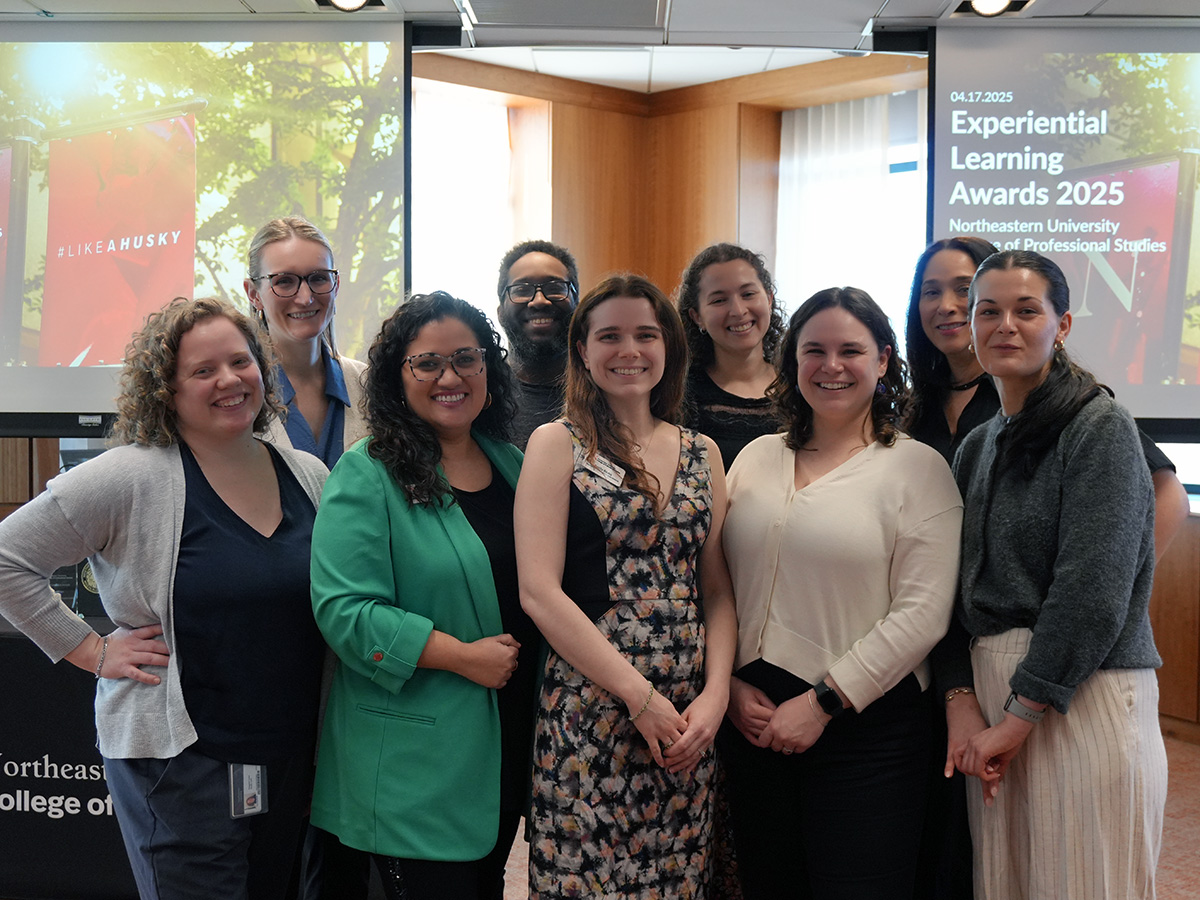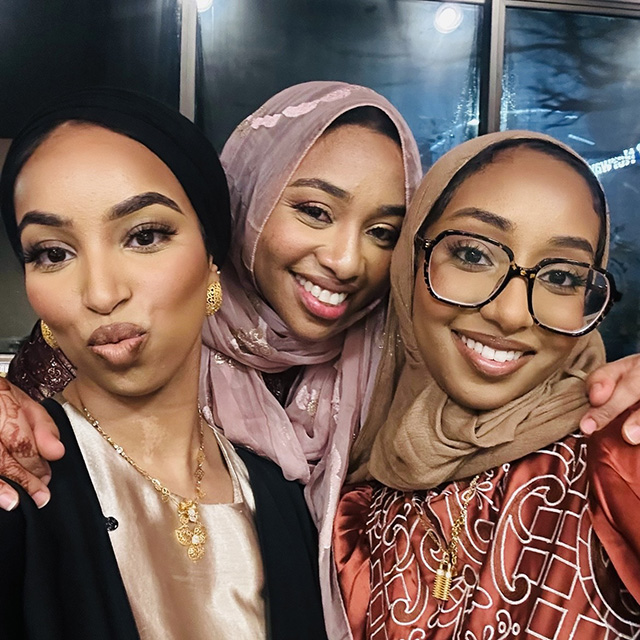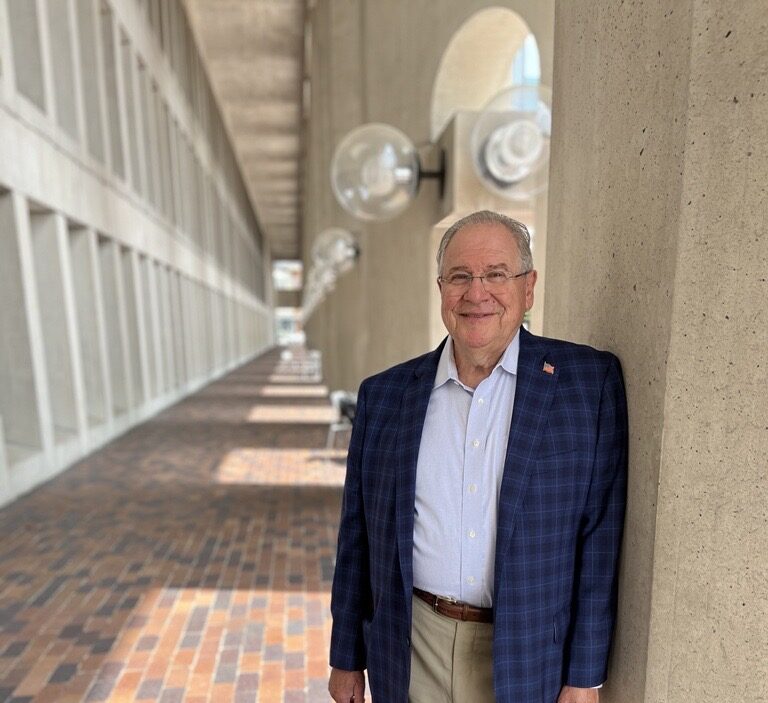Graduation 2021
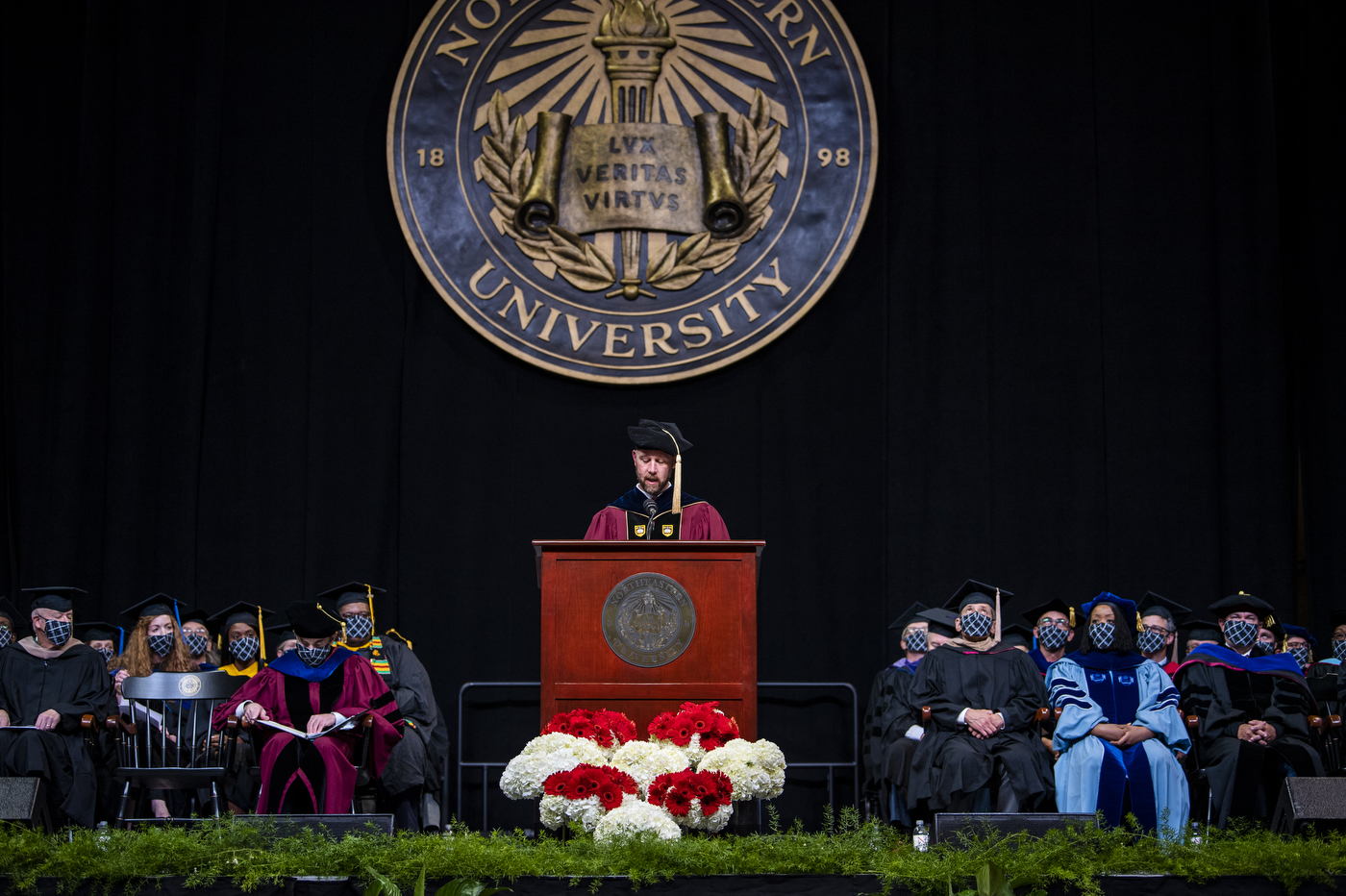
College honors master’s and doctoral graduates, citing ‘ingenuity and resilience’, with ceremonies that emphasize service, perseverance and experiential learning.
Doctoral Hooding
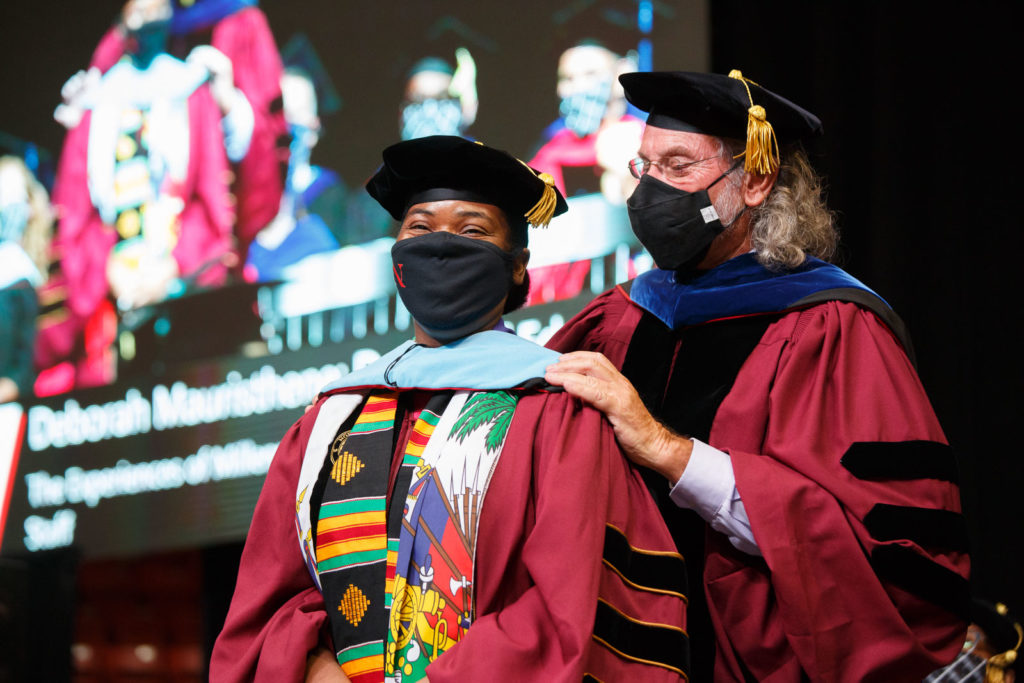
The words of Brent Musson, (Doctor of Law and Policy ’20), captured the mood at the Doctoral Hooding and Graduation Ceremony of the College of Professional Studies in Matthews Arena Sept. 9—and at the Master’s Graduation Ceremony in the same location the following day: “Humanity at its best,” the 2020 Dean’s Medal recipient said in his remarks to the successful doctoral candidates, “is humanity in gratitude.”
Gratitude was in abundance both days as faculty, administrators, students and their families—as well as friends of the College worldwide via livestream—celebrated the graduates’ achievements in the face of extraordinary challenges. Speakers at the ceremonies praised the degree recipients for their perseverance in scholarship despite a global pandemic, their passionate commitment to learning and their determination to address real-world problems in their project-based learning and research.
‘Both humility and pride’
In his opening remarks on Sept. 9, Provost and Senior Vice President for Academic Affairs David Madigan, Ph.D., welcomed the College of Professional Studies (CPS) community, expressed his faith in the graduates’ future success and his pride in their accomplishments and celebrated their membership in Northeastern’s “powerful knowledge network” dedicated to the dream of a more just and equitable society. He was followed at the podium by Interim Dean of CPS Dr. David Fields, who noted the unusual degree to which CPS students break down the barriers between work and learning.
“Our doctoral students are already fulltime professionals and leaders in their fields,” Dr. Fields observed. “In true Northeastern fashion, they are researching what they live, and living what they research, every day.”
Dr. Fields went on to explain the significance of the hooding ceremony—so-called because doctoral students traditionally have the hoods of their academic regalia lifted over their heads by faculty.
“The symbolism of the hooding ceremony at our doctoral commencement honors both the doctoral candidate’s work and the network of relationships that make that work possible,” Fields said. “[It] embodies both humility and pride, on both sides of the relationship, as faculty members welcome a new peer into their community.”
Faculty speaker Dr. Mounira Morris (B.S. ’91, M.S. ’95), assistant teaching professor and the co-lead for the Master of Education in Higher Education Administration program, offered her congratulations to the graduates and acknowledged the special challenges that had arisen during their studies, including the pandemic and the persistence of racial injustice. She quoted James Baldwin, noting his achievements as a playwright, novelist and civil rights activist: “Not everything that is faced can be changed, but nothing can be changed until it is faced.”
“To me,” Dr. Morris said, “this means that at times we will collectively endure hardship; however, we can use these experiences, especially as doctors, to offer wisdom, hope, and a better path forward.”
A longtime leader in diversity, equity and inclusion (DEI)—and currently working with colleagues at Northeastern to develop a new academic credential in DEI—Dr. Morris emphasized the power for good inherent in the attainment of an advanced degree, encouraging the graduates to find creative solutions to the challenges in their professions, communities and personal lives.
“We, as faculty,” she said, “ask that you take your research, and go out and change your world, your profession, your workplace and make it just a little bit better than before. We, as faculty, believe you can persevere and persist. We know you can.”
Intellectual explorers
Dr. Musson, whose acceptance of the 2020 Dean’s Medal had been previously postponed due to Covid-19 precautions, suggested in his remarks that the attitude of an academic researcher is “not that of an author or maker, but rather that of an explorer.” He praised the selflessness and commitment of his peers and made a critical distinction between an undergraduate education—which, he said, “teaches a student how to learn”—and a graduate education, in which students learn “to use tools … to solve other people’s problems” and to create value, going “from inward-facing to outward-facing.”
He noted that, soon after a doctoral candidate’s academic journey begins, “we become acutely aware of what we’re signing up for; to spend the next few years engaged in the most rigorous intellectual exercise of our lives, to extract a single, pure, tiny drop of insight to ever-so-slightly raise the sea level of the ocean of human knowledge.”
And he described a moment of inspiration in what he termed a spiritual awakening: a street soccer game he had observed in West Africa more than a decade earlier, where, when a beautiful goal was scored, both teams celebrated. Drawing a parallel between the players’ selfless joy and the academic community he had found at Northeastern, Dr. Musson said, “These happy boys had purpose; and that purpose made them work together, against all odds to orchestrate a moment of greatness—a moment of pure, unselfish greatness.
“I’ve never circled a soccer field making wings with my arms,” he continued, “but research has made me part of our team, and this humbling honor is our winning goal.”
As Dr. Musson finished his speech, the audience rose to deliver a sustained standing ovation.
At the conclusion of the ceremony, Dr. Madigan returned to the stage to offer closing remarks, praising the successful doctoral candidates for their “drive, dedication and sense of purpose.”
“The world is ever changing,” he said, “but you are prepared to meet—and conquer—its challenges.”
Master’s Ceremony
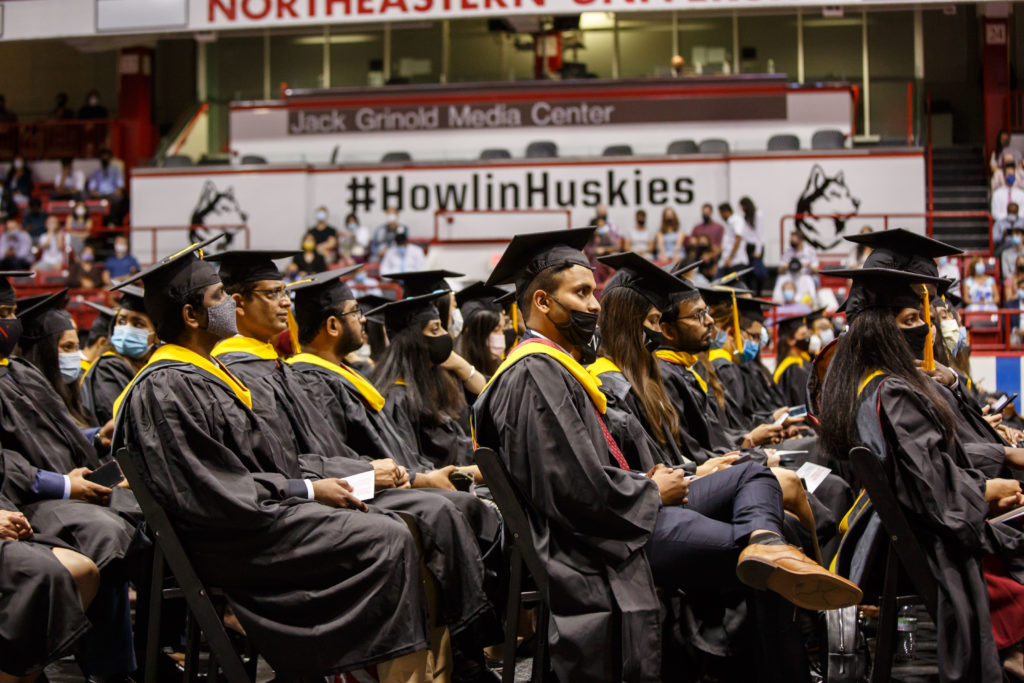
‘A day full of promise’
The following afternoon, Dr. Madigan returned to welcome master’s graduates to the arena on “a day full of promise.” He praised their “clear-eyed determination, discipline and hard work,” and offered special recognition to the faculty who, he said, by guiding the graduates to success, “have strengthened a legacy of knowledge and helped shape the future in scores of fields of professional endeavor.”
Following Dr. Madigan’s remarks, Dr. Fields spoke, celebrating the graduates’ global engagement and their cultivation of “the cultural competencies needed for a lifetime of contribution in a fast-paced, diverse, global society.” He went on to emphasize the benefits of their embrace of experiential learning, noting that in so doing, they had “addressed pressing, real-world problems” and become “well-prepared to lead from experience in the workplace.”
Dr. Fiona Creed, associate teaching professor and faculty director of the Global Studies and International Relations program, next introduced student speaker Ebony Small, ’21.
Reflecting on a year of adversity, Small observed “the pandemic itself could neither make nor break us” and asked graduates to consider the ways in which the challenges of the past 18 months had taught them to know their own courage, ambition, and steadfastness.
“We did not make it to this moment merely because we just-so-happened to survive a global pandemic,” Small said. “No, we made it here because we made the choice to value education and then fiercely pursued it. My dear friends and colleagues, despite the unexpected challenges of this year, we thrived. We grew. We changed.”
“This,” she concluded, “is what it looks like to turn a choice into a change. This is what it looks like to champion growth. Congratulations.”
From humble roots to world-renowned
Following an introduction by Dr. Earlene Avalon, associate professor and lead faculty for Health Administration and Health Sciences, graduation speaker Carl H. Whittaker, a philanthropist whose life path has spanned business, engineering and music, addressed the community.
A director of the Herb and Maxine Jacobs Foundation—which supports the College’s “A2M” or “Associates to Masters” program, offering an accelerated pathway from a community college associate’s degree to a bachelor’s at the College of Professional Studies and a master’s degree in Biotechnology at Northeastern’s College of Science—Whittaker began by invoking Northeastern’s origins as a vocational school offering evening classes, run by the YMCA.
“We all know that Northeastern is now a world-renowned university, highly ranked in many fields,” Whittaker said. “But inside this world-class institution is still the legacy of that 1898 night school.”
Whittaker linked this history with Northeastern’s emphasis on internship experiences, co-ops, and other programs that connect students to “great employers and great jobs.” He applauded the graduates for their effort and creativity in juggling jobs, families, and studies, urged them to embrace the role of mentor for other aspiring scholars, and invited them to fight income inequality—as his foundation does in part by supporting scholarships at Northeastern.
“I am inviting each of you to join my fight against economic inequality by encouraging at least one or two others to join you in earning an advanced degree,” Whittaker said. “Just be ready when you see a family member or neighbor who would value your guidance. Your friendly support might be thing that leads someone to a more prosperous and fulfilling life.”
The Doctoral Hooding and Master’s Ceremony were livestreamed from Matthews Arena. Click the links below to view recordings of the ceremonies.
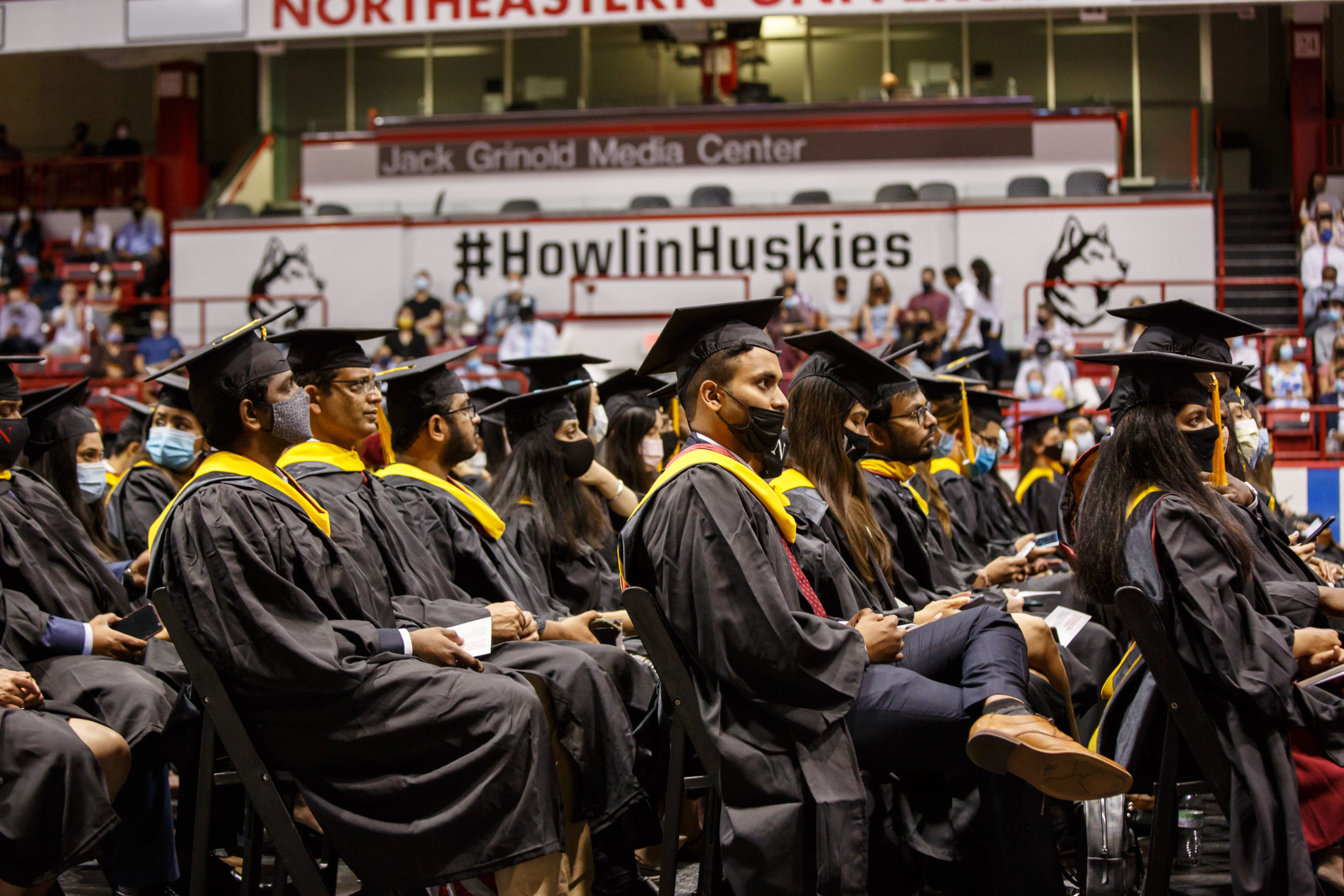
Watch the Ceremonies
The Doctoral Hooding and Master’s Ceremony were livestreamed from Matthews Arena. Click the links below to view the graduation pages and watch recordings of the ceremonies.
